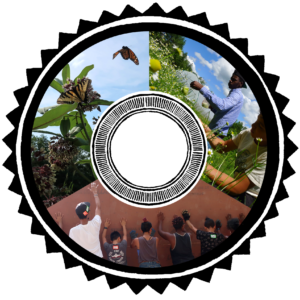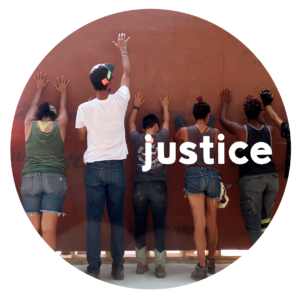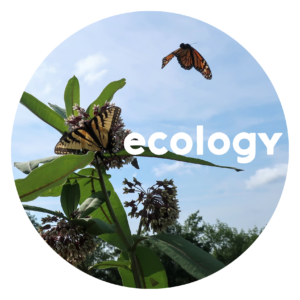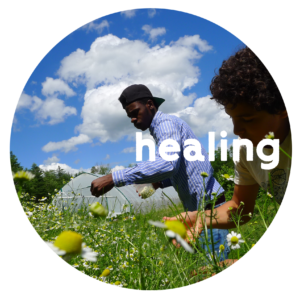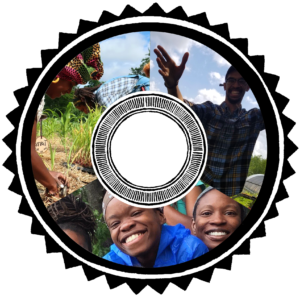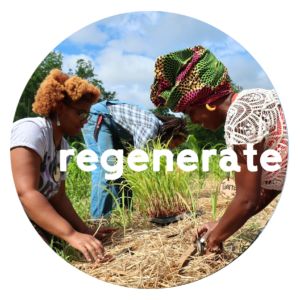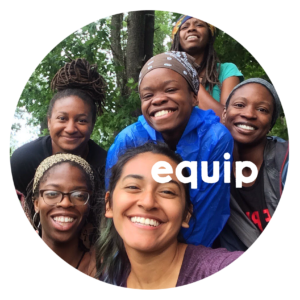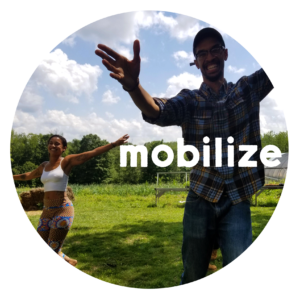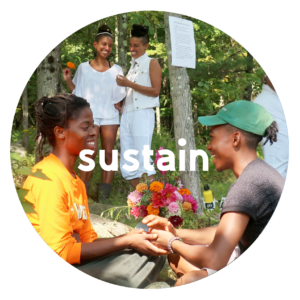We are working to uproot racism in the food system by focusing on three areas in need of transformation:
JUSTICE | We need equity in access to land, sustenance, and power in the food system. The food system is built upon land theft and genocide of indigenous people and the exploitation of Black and Brown labor. Black farmers currently operate around 1.2% of the nation’s farms, having lost over 12 million acres to USDA discrimination, racist violence, and legal trickery. 78% of the people working the land in the US are Latinx migrant workers, yet only 3% of farms are owned and operated by Latinxs. People of color are disproportionately likely to live under food apartheid and suffer from diabetes, heart disease, and other diet related illness. Labor laws continue to permit the exploitation of farm and food workers.
ECOLOGY | We must reverse industrial agriculture’s damage to the planet and harm to vulnerable communities. Industrial agriculture is responsible for 24% of greenhouse gas emissions, 70% of water use, and 37% of land use. Environmental impacts of climate change, pesticide exposure, and toxic pollutants harm communities of color disproportionately. Regenerative farming practices rooted in African-Indigenous wisdom and technologies are part of the solution to feeding the world without undermining its ecology, and have been ignored, erased, or appropriated by mainstream society.
HEALING | It is time to heal from a history of oppression that has disconnected our communities from land. A history of land-based oppression and forced migration have resulted in a concentration of people of color in urban environments, often devoid of the psycho-spiritual and somatic benefits of connection to the earth. “Nature deficit disorder” can lead to ADHD, anxiety, depression, poor eyesight, and lower achievement in school. Lack of access to quality food and outdoor play is putting youth at higher risk for early onset diabetes and learning challenges, and later in life, heart disease, sleep apnea, psychological challenges, stroke, and cancer.
We are working to seed community food sovereignty by focusing on four goal areas:
REGENERATE | We use Afro-indigenous agroforestry, silvopasture, wildcrafting, polyculture, and ancestral farming practices to regenerate 80 acres of mountainside land, producing fruits, plant medicine, pasture-raised livestock, honey, mushrooms, cultural seeds, and vegetables, with the majority of the harvest provided to people living under food apartheid and targeted by state violence. Our ancestral farming practices build topsoil, sequester soil carbon, and increase biodiversity. Buildings are designed to minimize impact on the environment in construction and use, and be durable for generations to come.
EQUIP | Through our “Afro-Indigenous Farming” immersion and workshops we annually equip hundreds of adults and youth with the land-based skills needed to reclaim leadership as farmers and food justice organizers in their communities, to heal their relationship with earth, and to imagine bolder futures. Using land as a tool to heal from racial trauma, we work to reverse the dangerously low percentage of farms being owned and operated by people of color and increase the leadership of people of color in the food justice movement. Through our Fellowship Program, graduates receive ongoing support to access resources, land, funding, mentorship, and platform.
MOBILIZE | We are mobilizing the public to create a racially just food system. We collaborate with regional, national, and international food sovereignty coalitions to advance reparations, establish action platforms, and work on campaigns for farmer survival and dignity. Each year, we inspire thousands of community members through speaking at conferences, publishing articles/book chapters, and facilitating workshops for activists to share tangible methods for dismantling racism in the food system and increasing community food sovereignty.
SUSTAIN | We uplift radical community care. In line with our work to advance healing justice and liberation in the wider community, we commit to an internal team culture that uplifts compassionate communication, ample rest, distributed leadership, fair compensation, and investment in personal and professional development. We maintain an organizational infrastructure that is responsive, transparent, and accountable.
Summary of our 2025 Strategic Goals:
Farm Ecosystem:
- Preserve soil health and perennial cover for sustainability.
- Enhance farm operations, compost, irrigation, and biodiversity systems.
- Save and share seeds of culturally significant varieties.
Solidarity Shares:
- Deliver 10,000+ pounds of produce to 200+ individuals and organizations.
- Expand program accessibility and Spanish resources.
- Increase community-driven pick-your-own opportunities.
Farm-to-Table:
- Provide fresh farm ingredients for program/programmatic meals and create value-added products.
- Expand value-add distributions to local community and reduce food waste.
- Optimize root cellar and food preservation systems.
Infrastructure:
- Upgrade facilities for safety, accessibility, and ecological harmony.
- Beautify the campus and develop trails.
- Maintain essential equipment and create role-specific guides.
Farmer Training:
- Train 75+ BIPOC farmers through immersive programs.
- Foster learning spaces addressing privilege and oppression.
- Develop resources to support BIPOC-led farms and carpentry skills.
Soul Fire in the City:
- Build 10 urban gardens and support soil remediation efforts.
- Distribute garden surplus and host inclusive community events.
- Foster mentorship and mutual aid among gardeners.
Community Events:
- Host farm tours, festivals, and youth immersion programs.
- Offer intergenerational and emergent land-based activities.
- Inspire advocacy for food justice through community engagement.
Fellowship & Alumni Services:
- Support Soul Fire Farming Immersion alumni with training, grants, and mentorship.
- Support Braiding Seeds fellows and alumni with training, grants, and mentorship.
- Pilot infrastructure and land access project for Braiding Seeds fellow/alumni farms.
- Strengthen regional and national connections through gatherings.
Coalitions:
- Collaborate on campaigns for food sovereignty and reparations.
- Advance policies like SNAP4All and Farm Bill reforms.
- Complete the return of 250 acres to the Mohican Nation in collaboration with the Peace Pagoda and build international solidarity.
Publications & Media:
- Continue to author, contribute to and share food sovereignty guides and reach 115,000+ through virtual and media forums.
- Expand the Each One Teach One (EOTO) series to include new topics and teachers.
- Align messaging across platforms for greater impact.
Uprooting Racism & Public Speaking:
- Train 600-800 aspiring attendees through our Uprooting Racism Trainings.
- Support alumni through grants, reunions, and technical exchanges.
- Catalyze the transfer of resources and knowledge through powerful storytelling to 5,000 attendees across 30 events, highlighting staff, alumni, and partners.
Work Culture & Policies:
- Foster a positive work culture with annual culture conversations, skill-building, and feedback rooted in care.
- Provide personalized professional development for staff.
- Update health, safety, and security guidelines, including EAP and de-escalation protocols.
- Achieve 80% staff satisfaction in work culture, development opportunities, feedback, decision-making, and job success.
Finance & Administration:
- Ensure financial stability with a 12-month reserve, diverse income, ethical funding standards, and timely donor reporting.
- Enhance planned giving awareness with a website FAQ.
- Grow to 200+ recurring monthly donors through a sustainer campaign.
- Advance ethical investment strategies prioritizing social equity, sustainability, and resilience.
Impact Ratio:
- Maintain an efficient impact ratio, engaging 150+ participants per staff FTE.
Staffing:
- Hire an Administrative Program Manager (1.0 FTE) and Deputy Development Director (1.0 FTE for half-year).
- Transition a farm contractor to a part-time employee (0.5 FTE), increasing staff from 15.2 to 16.4 FTE.

